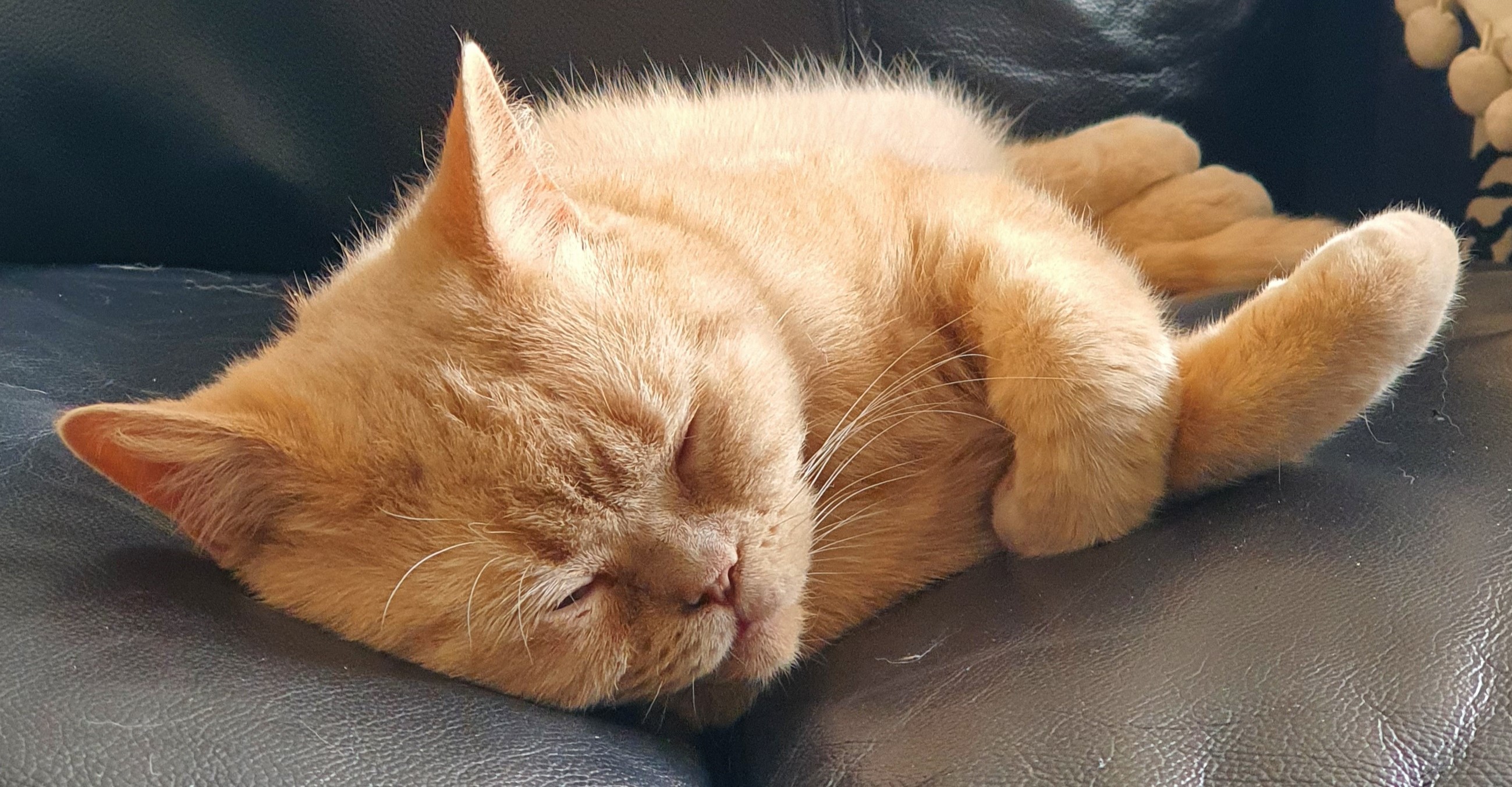In some of the music communities I’m in the content creators are already telling their userbase to go follow them on threads. They’re all talking about some kind of beef between Elon and Mark and the possibility of a boxing match… Mark was right to call the people he’s leaching off of fucking idiots.
I care. I’m just increasingly convinced it’s too fucking late.
Tbh it’s not black and white. I’m sure a big corporation can extract a ton of information on us but there’s still a pretty big gap between having our real names and photos plastered everywhere on social media, or them just knowing where I live and that I spend a lot on steam games. Don’t take the small victories for granted.
It is. They know everything about you. Even every store you have shopped at knows a lot about you. It really doesn’t take much interaction for a company to get a lot of info. It’s relatively easy to get an email and from there, if they wanted, they can get the rest of your profile from a 3rd party who has your data all matched up already. They can also build your profile pretty easily themselves as well.
Me. I care I just…fuck. That ship has sailed. I don’t go out of my way to download the big offenders like Tik Tok but…still. Everyone is tracking me. Everyone is selling my information. God knows how many different companies have massive files on me.
Even if you get them to care once you show them all they need to do to have a shred of privacy they shrug say something along the lines of “well I don’t have anything to hide anyways” and go back to their merry way. The path of least resistance will always win sadly
Literally saw a comment like that yesterday. Drives me up the wall. I’m in the process of accepting that the average Joe/Jane just doesn’t care about anything but their little bubble. I used to spend so much emotional energy on trying to convince people to stand up for something greater or to at least think more than 2 meters ahead, but now I’m just done. I’ll watch out for myself and the people close to me, everyone else can just evaporate for all I care.
Congratulations, you now have your own little bubble.
I literally just had a friend tell me he joined Threads and how neat it was, etc etc and when I explained why I wouldn’t be joining him, he basically just gave me the old “Well I already know they have all my information so it doesn’t matter”
…like wtf? So you just…give up having any privacy whatsoever? I just couldn’t respond to him after that, I don’t really know how to respond to that. There’s a disease spreading in the world unfortunately and it isn’t just COVID. It’s one called Apathy and too many people are coming down with it.
Honestly he has a point. I was born right before Y2K. My entire life has been online. I’m sure with enough digging this account can be linked back to my IRL identity. They already have any and every bit of information about me, what’s a little more?
People don’t care and are never going to care. They can track us by anything already and don’t need you to give them any info. The algorithms that they use can identify you if you sign up or not.
It’s not apathy per se, it’s more resigned acceptance. There is no privacy anymore, even if you do everything in your power not to be tracked. Unless you live completely off the grid, cash transactions in places without security cameras only and no bank account/online accounts you’re going to be tracked by big tech.
I just use my name and say whatever I want here.
No one will ever believe you anyways.
If threads scrapes these sites and somehow links your account to your name, do you really want do recieve ads related to your complaint of an illness or condition? You should want to mantain privacy, or at least anonymity.
For the web scrapers, I, actual Hollywood superstar Margot Elise Robbie, stand by everything I’ve ever said on Lemmy that I would never say in real life, including the following:
Sam Altman and his web scrapers can scrape my Academy Award nominated dick. - Margot Robbie
Is this like that story where Jim Carey took a handful of fries from someone’s plate and said “Nobody will ever believe you”?
Because I want to believe…
I’m not sure that they ever did.
The turning point for me when I really got a concrete realisation about people absolutely not giving a shit about this was when Snowden came out and I saw the majority of people just go “Eh, that’s pretty fucked, whatever”, and then immediately jump straight back into scrolling facebook all day long.
I realised then that there probably wasn’t any point expecting anything from them. I don’t have much sympathy left for people in this regard anymore.
Most people legitimately don’t give a shit about this issue. I think that they really should, but they absolutely don’t for the most part.
Can’t disagree with anything you just said
I tried to explain this to my daughter in law when she suggested my wife just use the same password for everything, including online banking.
Ended up in a big row about how she doesn’t give a shit because she has nothing to hide.
Didn’t talk to me for a week.
Thinking about that, perhaps I should rack it up as a success 😏
Privacy is complicated and often a luxury. Not everyone has the technical understanding to protect their privacy, nor the money to always choose the privacy-conscious option (which are almost always paid options). And to be honest, they shouldn’t really have to if governments did their jobs and brought in effective privacy protection laws.
I think a big part is people don’t understand the impact of what they are losing. It’s not something tangible like their wallet or car being stolen, it’s just “information” and they don’t understand how that data can be used against them. Even when examples are given, such as the Cambridge Analytica incident, they think they are smart enough to be impervious to the manipulation so it doesn’t matter.
Also anyone younger than probably 20ish has never known anonymity on the internet and so it’s hard to convince them to make sacrifices to convenience for something they’ve never had (and never will, no matter how much you try)
I feel like Cambridge Analytics stuff was about picking out who might be vulnerable to those types of political campaigns and by nature there’s probably a bit of a correlation between that type of vulnerability and a lack of understanding of why their privacy is important.
The people who recognise it’s important are unlikely to be the ones picked out by these groups anyway
Hard disagree. Nobody is above this stuff. Thinking you aren’t vulnerable is a good way to become more vulnerable.
Sorry I think you misinterpret what I was saying.
Im saying that those who don’t care about it are also likely the ones that need to care about it the most.
It’s more that the average person doesn’t have a clear understanding of what the cost is of not protecting your privacy.
The Internet is basically a privacy economy, where you sell your privacy in return for free services, and to most people this feels like a very one sided exchange. They’re giving away something that to them has no percieved value.
What privacy advocates need to get better at is actually explaining to people what the value of their privacy is.
I’m just curious if you’re a tech worker? (or a teenager interested in tech)
I ask because I feel like people who work in tech are basically exposed to the dangers of web privacy all the time. I remember having to implement a facebook pixel on a website, and realizing the network of surveillance that facebook have spread across the web at that time. So I have pretty decent privacy behaviors, still far from great but maybe slightly above average.
But when I go to the doctor and I mention how often I eat fast food and drink alcohol, or when I go to the dentist and admit I don’t floss everyday - I’m sure those people are thinking ‘most people seriously don’t care about their health’. They might stop short of ‘fucking idiot’, hopefully.
i love a good analogy. point taken.
I’d also say that those health issues are much more practically impactful than Instagram showing you ads for luggage when you’ve bought a plane ticket.
Caring about ad tech is a hobby. It’s as good a hobby as any other, but that’s what it is.
Sure I think thats fair. My larger point is that everyone is biased over time by their hobbies and professions, and we should be careful how harshly we judge others by our yardstick.
You can be casual about it, but I don’t think it’s a hobby to seek to understand something that you’re very nearly forced to coexist with. I have to acknowledge there’s ideology behind statements like this, but it’s more analogous to knowing your enemy’s capabilities. It’s a necessary prerequisite to forming an effective defense.
But I’ve come to understand many people don’t share my antagonistic mindset. That’s fine, but they should still understand the interactions they’re having with these systems in even just the vaguest terms, because the effect on their lives is very tangible.
I’m saying the very idea that you need to ever even think about this as a defense against the enemy is the hobby. There’s only a battle to be fought here if you want there to be, and most people don’t want that. The impact on their lives is not actually tangible. Ad tech doesn’t really hurt anyone. No one likes it, and at best, it feels a little gross, but feeling vaguely icky is not the kind of tangible impact that reliably drives people to action. What happens to you when Facebook or Google bundle you into anonymized groups of eyeballs and promise advertisers that they’ll show you ads relevant to the profile they’ve built of you? Nothing really. If you think about the way they built that profile by tracking your every move online, then yes, it feels creepy, but that’s it.
The average person doesn’t understand modern technology even on a basic level. Most people don’t know what Free Software is or what end-to-end encryption is and you can’t have privacy without those two. And those things have existed for decades. What about more complicated topics such as cryptocurrencies or AI? It’s easy to see that most people don’t understand them either.
So when it comes to some basic aspects of modern technology, most people are decades behind. Sometimes I even meet software developers who don’t fully understanding those topics.
Sometimes I even meet software developers who don’t fully understanding those topics.
“Even” software developers? That’s kind of a weird thing to say. Programming as a discipline is far broader and deeper than most people realize (and that includes software developers!). Knowledge in one limited specialty does not translate automatically into knowledge in a different specialty and, indeed, can actively interfere with another domain without intensive retraining. (For a concrete example of this, just look at the abominations made in "embedded"1 programming by people coming at it from writing Yet Another CRUD-backed Web App.)
So it’s absolutely possible for someone who’s a real whiz with making web app front ends to have a very hazy grasp of security and privacy. It’s a peripherally-related discipline at best.
1 “Scare quotes” used because I don’t view what amounts to a PC running Linux in a funky form factor as meaningfully “embedded”.
I just expect programmers to know more about software. They should know those things at least on a basic level. They should be the ones to educate people about it, because otherwise who will do it?
If software developers don’t understand what end-to-end encryption is, what hope can we have that an average person will understand it? I just don’t know how we can make progress if even technical people don’t know technology well enough.
You missed the part about how large software is.
I could (and probably have worked!) my entire professional life in domains you’ve never once caught a glimpse of using kit you wouldn’t recognize. To me it’s trivially obvious how to, say, debug an SPI bus timing problem where you might not even know what an SPI bus is without looking it up in Wikipedia first.
(I guarantee you that within 3m of you there are orders of magnitude more SPI connections than any form of encrypted connections.)
Now the only reason I know what end-to-end encryption is and why it’s important is because I took a short break in my mainline career and worked on PKI for about six years. (I then ragequit commodity software and went back to actual software engineering, but that’s a different story.) Had I not had that experience I could likely have made some guesses as to what E2EE entailed, but I certainly wouldn’t have understood immediately why this was a critical feature.
Really, software is a FAR LARGER domain than you think. Hell, it’s far larger than I think, probably, and I think it’s ten times larger than you think. 😉
You are right that it’s a huge field, but I’m not saying that we should be familiar with all of it. I’m saying that since we rely on software every day, there are a few concepts that every person should understand on a basic level. That knowledge would help them make better decisions and probably the world would be better if most people had it. Software developers should also understand those few concepts, but perhaps on a bit deeper level than an average person would.
A person can have privacy without knowing what SPI is, but it’s very unlikely for them have it or keep it long term if they don’t know what Free Software is. What you do requires deep knowledge of the hardware, which an average person doesn’t need to have. But they should know what cryptocurrencies and AI are, since those technologies are slowly becoming a part of our lives.
I don’t blame average people or software engineers for not knowing those things. But I think something went wrong in our society if people don’t understand very important concepts that impact our daily lives and which are mostly decades old. This proves that we can’t keep up with modern technology even on a basic level. Don’t you think that’s bad?
I’m saying that since we rely on software every day, there are a few concepts that every person should understand on a basic level.
Loooooooooooooooooooooooooooooooooooooooooooooooooooooooooooooooooooooooooooooooooooooooooooooooooooooooooooooooooooooooooooooooooooong before anything software-related I’d put knowledge of fundamental statistics in the queue for things people deal with on a daily basis that they should understand at a basic level. It’s one of the most critical skills a person can have in modern life and it’s one that almost nobody (including almost all programmers) has any kind of understanding of. If they did have a better understanding of it, to quote the Great Sage Equalling Heaven:
That knowledge would help them make better decisions and probably the world would be better if most people had it.
😉
And that’s just the beginning of the list. I’d also put basic psychology, basic marketing, basic civics even ahead of any degree of software knowledge. Knowing marketing, for example, wouldn’t cause someone to be fooled to the point of saying something like this:
But they should know what cryptocurrencies and AI are, since those technologies are slowly becoming a part of our lives.
But gentle snark aside:
But I think something went wrong in our society if people don’t understand very important concepts that impact our daily lives and which are mostly decades old.
Try tens of thousands of years old. You make it sound like the problem is technology. The problem is the same as it’s always been: people. A better understanding of people, of their motivations, of the tricks they use to further those motivations, etc. is what makes you better able to manage life and society. Understanding the tricks of marketers and advertisers (even before those were words in human language!) is what makes you understand things like “hype cycles” and “if you haven’t paid, you’re not the customer”. You’re focusing on a single channel of abuse. There are MILLIONS of channels of abuse. Learning why people find said channels and how/why they exploit them is a far more valuable skill.
Oh, and statistics. You need that too. You have NO idea just how bad we are at those and just how important that knowledge is for spotting grifters, liars, and other scum.
Yes, there are many things that people should be taught at school. Technology is just one area. All of the things you said are also very important, but it doesn’t make what I said invalid.
Knowing marketing, for example, wouldn’t cause someone to be fooled to the point of saying something like this:
But they should know what cryptocurrencies and AI are, since those technologies are slowly becoming a part of our lives.Fooled by what exactly? A distributed ledger or machine learning? I think it’s a simple fact that those technologies are becoming more popular.
You make it sound like the problem is technology.
The post is about privacy and software. It’s important for people to be educated in other areas as well, but they weren’t the topic of this discussion. So there was no point for me to mention them.
You’re focusing on a single channel of abuse.
I make software, so I talk about software. I’m not an expert in the other areas that you mentioned.
I make software, so I talk about software. I’m not an expert in the other areas that you mentioned.
You’re so close, and yet so far, from grasping the point with this pair of sentences.
I even meet software developers who don’t fully understanding those topics.
As an operations side IT, I’ve met a lot of developer side programmers (even really good ones) that don’t understand computers in a functional sense.
That’s kinda sad. I think our education is just not good enough when it comes to IT.
True, it should really be a foundational course now, and not just “here’s Microsoft office” level shit. With more advanced stuff left to collegiate courses.
Both programming in a high level language like python and A+ level CompTIA type thing.
I think most people realize they’re too boring for anyone with access to individual info to care who they are. Do you really care to know what porn I look at or what I’m buying online at 3am on a week night?
Nobody cares what porn you are into. Probably.
However, women using period trackers were free to do so in the US up into recently. Now that data can be subpoenaed and used to help prosecute if it is believed she may have had an abortion.
You never know when information posted online, or collected otherwise, could be used against you. It’s best to seek privacy respecting options whenever possible.
True, in that it’s a balance of risk versus reward. But there’s a middle ground between putting your SSN on a billboard and faking your death to go off the grid and burn off your fingerprints. I’m willing to bet 99.9% of people aren’t worried about it because they’ll never have to be.
What if I told you that you can increase your privacy a lot without having to fake your own death? You don’t even have to burn off your fingerprints! All you have to do is use alternatives to certain popular apps. Isn’t that great?
Just use Signal or Matrix instead of WhatsApp. Use Firefox instead of Chrome. At some point you could even replace Windows with GNU/Linux (an operating system that doesn’t spy on you! crazy right?). Some of those are tiny sacrifices, some are bigger, but none of them are impossible.
I get it. But I am experiencing absolutely zero drawbacks to any privacy concerns, so any potential sacrifice is almost completely unnecessary. I’ll support some similar things because I consider them good causes, but I have no problem being an open book. To bring everything back full circle, I assume most of the population feels similarly, and that explains why most people don’t care (which was what I was originally replying to).
So you see no problem in living in a world where everything is recorded. That’s crazy.
If the only people with access to it don’t even know who I am, it’s pretty inconsequential, especially since I’m often not doing things online or with a phone or computer. Everything isn’t being recorded.
For a lot of people we don’t know anything different. So to a lot it’s making a ton of extremely inconvenient sacrifices to try to claw back something we’ve never had in the first place.
Absolutely. Most folks will never have to worry about it. I would bet those using period tracker apps didn’t think it was a big deal either.
As a middle aged white CIS male, I am sure I have nothing to worry about. However, people in marginalized communities can’t be so confident.
Protecting basic privacy isn’t that hard and should be of interest to everyone. Governments and big corps shouldn’t know everything about us.
People who want to deliver you ads so that you may buy their product, thus helping their business, care
Yeah, but that’s my point. How is that gonna negatively effect me in any way?
They can try to influence your political opinions (manipulate you) by showing you certain type of content based on your current beliefs. They will show you content that is more likely to make you addicted to the platform. For some people that’s gonna be dangerous conspiracy theories or scams like alternative medicine.
Maybe you are immune to all of that, but many people clearly aren’t.
Kind of providing insight as to why most people don’t have any privacy concerns. I doubt most people consider that or think they’re so easily swayed. Heck, most people are practically apolitical.
Many people think they are not easily swayed, but in reality most people don’t have any training in critical thinking and often don’t know how to verify if something is fake. Things like confirmation bias make it pretty hard.
I stopped using Facebook 10 years ago, but I’m loathed to actually delete my account because every once in a while, a long lost friend or relative contacts me there. It would be a shame to lose touch with people. Ultimately I care about that more than privacy. It’s the same with Whatsapp. I’ve made a concerted effort to convince my immediate family to try XMPP, Delta Chat and Signal, but they just won’t install another app unless everyone they know is using it. I find it a bit frustrating, but that’s reality. So I have to keep using Whatsapp.
We can always keep a never in 10 years updated profile active for family and stuff. The biggest danger is for active users after all: they’re the most vulnerable to targeted media manipulation.
By being present in their lives (while giving up as few data as possible to big corporations) they can have by their side someone with good advices on privacy, manufactured consent, rights violations and adjacent topics. Alienating ourselves from them isn’t really beneficial in the long run.
I use WhatsApp as well for the people I keep in touch with, and have an active Instagram account where I use only the chat feature. It’s enough to keep up with the people in my life.
For whoever is even more privacy concerned, it’s possible to run those apps in sandboxed mode through some apps.
I use WhatsApp as well for the people I keep in touch with
And everyone in your address book not using WhatsApp should come by once in a while and slap you for selling their numbers for your convenience… You are right… keeping a basically inactive Facebook profile is harmless in comparison.
I live in Germany and everyone here uses WhatsApp. If you decide to uninstall it, you’re cut off from 95% of your friends, family and your coworkers.
It’s not an option to not use it, sadly. From what I understand, it’s like iMessage in the USA. Extreme monopoly and very hard to break out of it.
I live in Germany
Same here… and most of my contact list (and I) dropped WhatsApp when Meta bought them or a year later when the eavesdropping and phoning home to Meta was publically discussed in the media. The remaining minority is able to use another alternative on top of WhatsApp (that’s one of the reason I like to remond them that they provide Meta with data from the people opting out…). That was also nearly a decade ago (2014/2015), so pretending that you need to use WhatsApp in 2023 is indeed a choice.
pretending that you need to use WhatsApp in 2023 is indeed a choice
It’s not as easy as you make it sound. Between 2015 and 2022, Whatsapp’s marketshare has increased a lot in Germany. So it might’ve been comparatively easy to drop it 8 years ago. It’s not anymore.
Maybe I’d be able to convince a lot of my friends to install another app just for me. But it would be hard to do and involve a lot of arguing on my end. I’m not a missionary and I choose to spend my lifetime for other, more important things.
Or maybe you would realize that a lot of people think the same but are also convinced to be alone and unable to change anything… Just like it happened for me back then the moment the first few made the effort to change. We will never know.
They all are already on WhatsApp though. All my phone contacts are WhatsApp contacts already (and have been before I added them).
If I need to interact with anyone who desires ultmost privacy I’m not idiot enough to ask for their phone number, and they’d be really out of their mind to share if that’s the case.
But sure, I guess a cousin or smth might want to slap me in the face for “selling” data they already sold themselves years prior.
deleted by creator
First of all most people, not just the average person, simply do not grasp what privacy is exactly - especially in the US, where the view on privacy is skewed by its obsolete constitution.
I mean, just the fact that anyone would think if you personally don’t mind sharing personal affairs or being public, then privacy isn’t much of a concern proves the lack of understanding of that principle. It’s like saying, I’m not religious so neither the lack of freedom of religion or the separation of church and state would have any impact on me.
The most important function of the human right to privacy is not the thwarting of interference with one’s property or dignity, it’s the maintenance of the control and power an individual has over their own self - and by extension that of a people.
A simple example: If I give you my phone number, I give away some control over myself because you now have to power to use that property however it fits you. That may mean to just keep in touch with me, to save the number in your contact list that is accessible to ChatGPT, Tiktok or some malware on your phone, or share it with someone who wants to dig up some dirt on me.
The key point is not whether any of the possibilities affect or matter to you but whether you would have any say in how that information is obtained, handled, kept, etc. The effect of the resulting consequences may appear only gradually and sometimes take years but those in control ultimately shape politics, the economy, culture, society. This is also one of the reasons why the US is run by so many monopolies and oligopolies in their respective market segments.
It’s like music streaming. The streaming quality is worse and wireless earbuds don’t sound great, but the convenience of it all made that industry huge.
Convenience over quality.
I mean, I blame Apple and the general trend of aggressively bland minimalism for the wireless earbud thing. You’re not wrong though.
I resisted wireless earbuds forever (had the lightning -> 3.5mm adapter for quite a while) and I’ll never go back to wired earbuds on my phone. The ability to set my phone down while I’m doing a task with headphones in is a godsend for my ADHD.
The wire didn’t add sound quality for 99% of people who were using default Apple headphones or some $10 junk from Walmart anyways.
I mean I use galaxy buds at work installing flooring and I love it, but at home I listen to vinyl or the very least flacc with good headphones… but I guess im not the average person in this situation
Have a huge vynl collection, family doesn’t understand why I can’t just stream my music. They’ll never know the sweet sound of vynl.
The Average person, in my experience, doesnt give a shit about their privacy…because they are stuck on the notion of “what do I have to hide? I didnt do anything wrong!” with a heaping helping of not wanting to give up convenience on top of it.
And all attempts to explain them that you dont have to have anything to hide for your privacy to be important and be protected fall on deaf ears and accusations that you, the one trying to protect them must be some kind of bad/evil/criminal person to be that concerned with privacy.
These people tend to be absolute delights to deal with when their shit gets stolen, and they expect everyone else to fix it for them.
Well okay, with my piracy habit perhaps I do have something to hide😂
But I also think most people don’t realise they do have stuff to hide.
Everything should be private by default. All this shit about nothing to hide is the opposite of that - trying to justify why something should be private. The question is rather why it should be public.
There companies profit enormously on our data and we get exactly nothing in return except the ability to use their service, under the conditions that they put in place. We have zero power to change anything at all about what they provide for us.
A user in that context is similar to a loser. Someone who has no ability to control what happens.
I mean if you want to start paying a fee to use social media… that’s just the choice they make
I keep seeing people saying “I have nothing to hide” is a bad argument. But no one ever explains why it is. So for the people who say they don’t care about the privacy, what would you say to them about why they should care?
Because everyone has stuff to hide. You dont have to have criminal activity, ongoing or in your past, to want to keep your privacy and keep things hidden. I always counter with “Okay, then lets paint your social security number on the side of your car if you have nothing to hide”, and they always stammer and stutter about how thats different and that would cause them no end of headache if someone got it and stole their identity.
And yes, thats the point. You have stuff you want to protect and keep others from knowing. Not just for identity theft reasons, but for social reasons as well… You probably don’t want your spouse to know how much you hate their sibling for no reason, or want your boss to hear what you say about them at home, You dont want people at the bagel shop to know your bank account number and password, Or any of a thousand other things that you do every day, that you dont want other people to know about.
Personally, I’ve always thought “They could sell your data to insurance companies who might jack up your prices or claim something is a pre-existing condition” to be the most p we persuasive to people like my parents.
But Facebook/Twitter/etc isn’t telling out boss what we say about them at home. Or our SSN to every car we pass. Or how much we hate it family-in-law.
Unless you give them realistic reasons, they will always counter with “That’s different” because it is.
Some really good arguments. But here’s one from the Cyber Security side. We all know about the CIA, but do you know about the other CIA?
- Confidentiality – Information that you store or transfer is only readable to those you designate.
- Integrity – Information you store or transfer is only alterable by those you designate.
- Availability – Information you store or transfer is available to those you designate when they need access to the data.
Confidentiality is the heart and soul of a functioning life. You do have stuff to hide, even if you say you don’t. Do you want a rando to know your passwords? Do you want your wife to find out about your birthday gift to her before the big day? Do you want your nosy neighbour to start gossiping to the entire neighbourhood about what you and your wife did on her big day? Do you want that big secret plan that will make you the next Mark Zuckerberg be found out by the real Zuckerberg and now he’s rich and you’re not? All of these are things that aren’t illegal, yet are still private information that someone like you might want to make confidential.
And this isn’t even the tip of the iceberg. Sure, you might argue, you shouldn’t be posting your plans for the Zuck-killer on Facebook, but your actual words are not the only thing Facebook stores and analyses. They know a lot about you. What you liked. What you commented on. What you searched for. What you looked at. They know things about you that you never ever said. For instance, even if you never said “I’m a Democrat” in so many words, or even if you don’t share overtly political posts, they still know your ideologies and are willing to sell this information to everyone and sundry. Facebook is even building profiles on people who never created accounts on Facebook. Imagine being Republican and working for a Democrat boss. You’ve worked hard to keep politics out of the workplace, because while there may be anti-discrimination laws if you’re a woman or a minority, having an unpopular political opinion is not protected in as many places, so you could easily lose your job if Facebook discloses to your boss that you’ve not got the right political views.
If Confidentiality really was not an issue and everyone could live open lives without consequence, we’d be talking about the IAs of security, not the CIAs. That we are talking CIAs shows that yes, there actually IS a need for secrecy, and we actually DO have things to hide, even if we don’t moonlight as murderers, cat-burglars, or strippers.
PS: I don’t believe you have never had it explained to you why 'I have nothing to hide" is a bad argument.
PPS: Very strong sea lioning vibes here.
PPPS: Seems like this nonsense started cropping up on Reddit when it became clear the protests were having an effect. And now it’s here. So much dishonest debate tactics being thrown around the whole “we want an alternative to the creepily intrusive policies of main-stream social media” debate. I wonder why? </sarcasm>
OK, ngl that
{democrat|republican}rendering as democrat is pretty cool.
I feel like the average person doesn’t understand their options and doesn’t want to understand them because it’s difficult to them. When I try to help explain privacy issues to others, their eyes glaze over instantly. They don’t want their private information to be collected and sold, but they don’t have the attention span to learn about “tech stuff”.






















